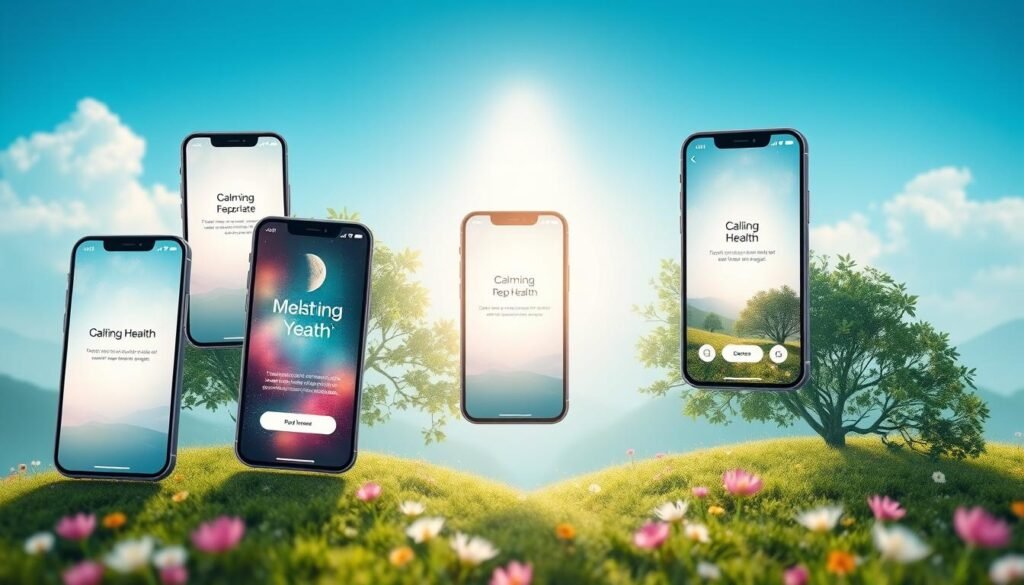About 37% of U.S. adults with depression don’t get treated. This shocking fact shows a big gap in mental health care. Geography, money, and stigma play big roles in this issue. However, technology has come to help. Now, we have mental health apps. They offer mood tracking, self-care ideas, and links to more help, which are great for dealing with depression.
We’re looking at the top mental health apps for people fighting depression. These apps are easy to use, work well, and can really help your mood. While these apps are helpful, they should not replace professional care. If you’re feeling very down or thinking of harm, please get help right away.
Key Takeaways
- 37% of adults with depression do not receive treatment due to various barriers.
- Mental health apps provide constant access, personalized content, and lower cost options.
- Features of mental health apps include self-assessment, symptom monitoring, and mindfulness exercises.
- Popular apps like Calm and Sanvello offer free trials and educational resources.
- Apps serve as supportive tools between therapy sessions, improving overall mental health management.
Introduction to Mental Health Apps
Mental health apps are becoming more popular. They offer crucial help for those dealing with depression. Around 17.3 million adults in the U.S. have clinical depression, yet 37% don’t get treatment. Smartphone apps for depression help fill this treatment gap.
These apps provide a personalized experience. Users can track moods, practice mindfulness, and do self-care activities. With 96% of American adults owning a cellphone and 81% with smartphones, it’s easy to manage mental health daily.
Research shows these apps are effective. One study found a 50% drop in depressive symptoms with app use. Over 90% of users felt better mentally after using these services. And with 74% of mental health apps being of good quality, technology is key in supporting mental wellness.
There’s a growing recognition of the importance of mental health apps. Apps like Calm and Sanvello use cognitive behavioral therapy, helping many seek structured support. Most of these apps have high user ratings, averaging 4.36 out of 5. This shows their effectiveness and how much users appreciate them.
| Statistic | Details |
|---|---|
| Adults with Depression | 17.3 million |
| Adults Not Receiving Treatment | 37% |
| Young Adults Affected | 13.1% |
| Adolescents Affected | 13.3% |
| Apps Exhibiting Quality | 74% |
| Apps with High Ratings (≥4.0) | 32% |
| Usability of Free Apps | 77% |
| Average Rating of Apps | 4.36 out of 5 |
Understanding Depression and Its Impact
Depression is more than just feeling sad. It’s a serious mental health condition that involves constant sadness and a loss of interest in things once loved. Over 17.3 million adults in the U.S. have faced clinical depression. This shows how vital it is to understand depression and its huge effects on life and happiness. The effects of depression go way beyond feeling upset. They can also hurt relationships, work, and overall life quality.

Symptoms of depression vary a lot. They include deep sadness, tiredness, and even physical problems. Because symptoms differ so much, it’s hard to spot and diagnose depression early. This can lead to longer periods of suffering. It’s critical to raise awareness about mental health. This can fight stigma and encourage people to get help.
A study found that only 29 out of 482 mental health apps really help with depression symptoms. Interestingly, 62% of these apps are backed by solid evidence. But, 83% don’t have a privacy policy that users can trust. This highlights the importance of being careful with these apps.
| Statistic | Percentage |
|---|---|
| Apps meeting inclusion criteria | 6% |
| Apps specifying evidence base | 62% |
| Apps with clinical design input | 41% |
| Apps providing interventions | 83% |
| Apps offering mood tracking | 66% |
| Apps including screening functionalities | 31% |
| App accuracy in identifying symptoms | 75% |
We spend less than 1% of our lives with clinicians. So, the way we use technology in mental health care matters a lot. Researchers and app developers are working to make resources more accessible. Advances in AI could make these tools even better. They could become more accurate, aiming for 90% correctness. This would help them be more effective in supporting mental health. By focusing on raising awareness, we can build a caring community. This helps people with depression find understanding and timely help.
How Apps Improve Access to Mental Health Care
Getting help for mental health can be hard for many people. Problems like living far away, not having enough money, and feeling ashamed are big hurdles. Thankfully, mental health apps are here to help. They give users ways to check on themselves, keep track of symptoms, and get therapy support without needing to go anywhere.
Barriers to Treatment
Living in remote areas can make it hard to find good mental health care. People in these places often don’t have enough professionals nearby, so they have to travel far. Money problems also make it hard for many to get the care they need. Without enough money or insurance, many can’t afford it. Also, the shame some feel around mental health issues stops them from seeking help. Mental health apps offer a private way to get help, making it easier to tackle these problems.
Benefits of Using Apps for Mental Health Management
Mental health apps bring a lot of advantages. They provide content that meets users’ specific needs, making self-care more engaging. These apps are often cheaper than face-to-face therapy. This makes managing mental health more accessible for everyone. Being able to access help any time lets users keep a close eye on their mental health, staying ahead in their care journey.
Research shows that more than 70% of those looking for outpatient help are keen on using apps for their mental health issues. Apps like Headspace have shown to make things better for those with depression and anxiety. As more people turn to these digital tools, the apps are becoming crucial in breaking down the barriers to mental health care, leading to improved outcomes.

Types of Apps to Help with Depression
There are many apps out there to help with depression. Each type has its own unique features. They meet different needs, making sure there’s something for everyone.
Mood Tracking Apps
Mood tracking apps let users record their emotions every day. This helps them see patterns and understand their feelings better. Daylio Journal and Youper are top picks, with ratings of 4.8 and 4.3 stars on iPhone and Android respectively.
Mindfulness and Meditation Apps
The meditation app industry is booming, drawing many users. These apps, like Calm and Sanvello, offer guided exercises for stress relief. They’ve earned high praise, with Calm and Sanvello getting 4.8 and 4.6 stars on iPhone and Android.
Journaling and Self-Care Apps
Journaling apps are great for putting thoughts and feelings into words. Daylio Journal is a favorite for its flexibility in logging daily life. It’s highly rated, with 4.8 stars on iPhone and 4.7 on Android.
Therapy and Cognitive Behavioral Therapy (CBT) Apps
Therapy apps add to regular therapy by using CBT methods. They tackle harmful thoughts and improve coping mechanisms. CBT Tools stands out, boasting a 5-star rating on iPhone and 4.3 on Android. It gives users high-quality mental health content on demand.
With so many mental health apps, staying updated is important. Websites like Healthline offer detailed reviews. This helps you pick the best app for your mental health journey.
| App Name | iPhone Rating | Android Rating | Price |
|---|---|---|---|
| TalkLife | 4.5 | 4.1 | Free with in-app purchases |
| Daylio Journal | 4.8 | 4.7 | Free with in-app purchases |
| Youper | 4.8 | 4.3 | Free with in-app purchases |
| What’s Up? | 4.4 | 3.9 | Free with in-app purchases |
| Sanvello | 4.8 | 4.6 | Free with in-app purchases |
| Happify | 4.5 | 3.6 | Free with in-app purchases |
| CBT Tools | 5.0 | 4.3 | Free |
Our Team’s Favorite Apps for Depression Management
Finding the right tools to manage depression is crucial. Our team has picked top mental health apps. They are tailored to fit various needs.
These apps help users take steps towards better mental health. They are easy and effective to use.
Calm
Calm is famous for its sleep stories read by celebrated voices. Good sleep is vital for managing anxiety and depression. Calm is perfect for getting quality rest.
It has over 200 calming sounds and landscapes. This helps create a peaceful setting for mental health support.
Sanvello: Anxiety & Depression
Sanvello teaches mindfulness and coping strategies for anxiety and depression. It provides community support and self-help tools. It’s among the top apps for all-around mental health care.
A premium version offers even more resources. This gives users more ways to handle their mental health.
CBT Thought Diary
CBT Thought Diary is based on cognitive behavioral therapy (CBT). It helps users monitor their moods and set realistic goals. This makes it easier to document thoughts and recognize patterns.
Its straightforward approach supports users in understanding and managing depression. It’s user-friendly and effective.
Daylio
Daylio combines mood tracking with goal setting. Reminders and stats help keep users on track. Its fun interface encourages daily mood reflections.
Users can see how small steps bring big changes over time. Using Daylio daily promotes healthy habits and resilience.

There are many resources to boost mental health efforts. For more on managing depression, check out Psych Central. Or explore educational content at Immune Vitality.
Functionality and Features of Popular Mental Health Apps
The success of mental health apps depends on engagement, user interface, accessibility, and content quality. Users like easy-to-use designs for smooth interaction. App accessibility is also key in reaching those without traditional therapy access. High-quality content from mental health experts is crucial for building user trust and improving results.
Engagement and User Interface
A great user interface is vital for mental health apps. Features that draw users in, like interactive tools and personalized content, help keep them active. Apps that engage users well can better lessen depression and anxiety symptoms. Sanvello and Moodpath, for example, mix eye-catching designs with effective CBT strategies, appealing to those looking for help.
Accessibility and Cost
Easy access to apps is a major reason they are used so widely. There are around 20,000 mental health apps, aiming for a $500 million U.S. market in 2022. Many offer free or cheap options, crucial where thousands of practitioners are needed. Thus, apps like MindShift CBT and iBreathe become valuable free resources for mental wellness.
Content Quality and Authoritativeness
The quality of content drives a mental health app’s success. Users trust apps more when the content comes from research and experts. The value of high-quality content is clear because evidence-based apps achieve better results. Ratings on content, feedback, and privacy affect how users see these apps and if they’ll use them for their mental health.
| App Name | User Interface | Cost | Content Quality | Privacy Rating |
|---|---|---|---|---|
| Sanvello | Highly engaging | Free with in-app purchases | Strong CBT content | 4 |
| Moodpath | Intuitive design | Free trial available | In-depth mood tracking | 4 |
| MindShift CBT | User-friendly | Free | Research-backed techniques | 5 |
| iBreathe | Accessible | Free with in-app purchases | Effective relaxation tools | 5 |
Safety and Confidentiality in Using Mental Health Apps
When you look at mental health apps, safety and confidentiality are key. Many top apps protect your privacy with strict rules and clear privacy policies. It’s important to check these policies before using an app. This makes sure your personal information stays safe.
Anonymity and Privacy Policies
Understanding privacy policies can be hard. Studies show that most mental health app policies are too complex. They often need college-level reading skills. Because of this, users might not fully grasp how their data is used. Surprisingly, only a few app makers share details about their Privacy Impact Assessments.
This unclear situation puts users at risk. For example, some apps send personal data without security, risking data leaks and hacks. It’s worrying that this could let unauthorized people see sensitive information.
Emergency Resources and Helplines
Good mental health apps do more than help manage your day. They link to emergency resources and helplines. However, not all apps make this crisis info easy to find. It’s very important for users to get immediate help if they need it. The American Psychiatric Association has a framework to help pick safe apps. This helps improve safety and privacy in mental health apps for everyone.
Pros and Cons of Mental Health Apps
Mental health technology is growing fast. Now, users who need support look into the pros and cons of mental health apps. These apps offer many benefits and have become a popular option. They offer fast support, flexibility, and many self-help options at a low cost. It’s easy to engage with them on your terms. Yet, knowing their limits is key.
Advantages of Using Mental Health Apps
Mental health apps can reach people who normally can’t get traditional care. More than half of Americans with mental illness find it hard to get help. These apps offer a solution with their on-the-go resources. They help with conditions like anxiety and depression. Many apps are free or cheap, letting users try different self-help methods easily. Features like tracking symptoms, self-care reminders, and group support make these apps even better.
Limitations of Mental Health Apps
But, these apps have downsides too. One big problem is the varying quality and lack of strict rules. This means users might find apps that are bad or don’t work. Many apps don’t have strong research backing them up. This makes it hard to trust their effectiveness. Users might also use these apps too much and miss out on real human connections. These are very important in therapy. By evaluating carefully, people can use these apps along with seeing a therapist.